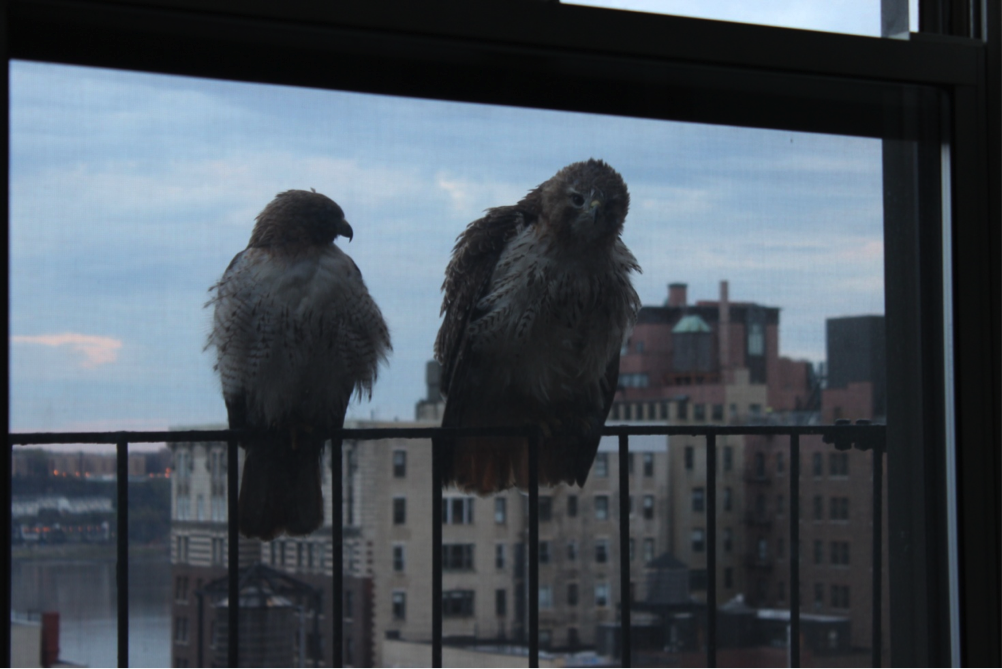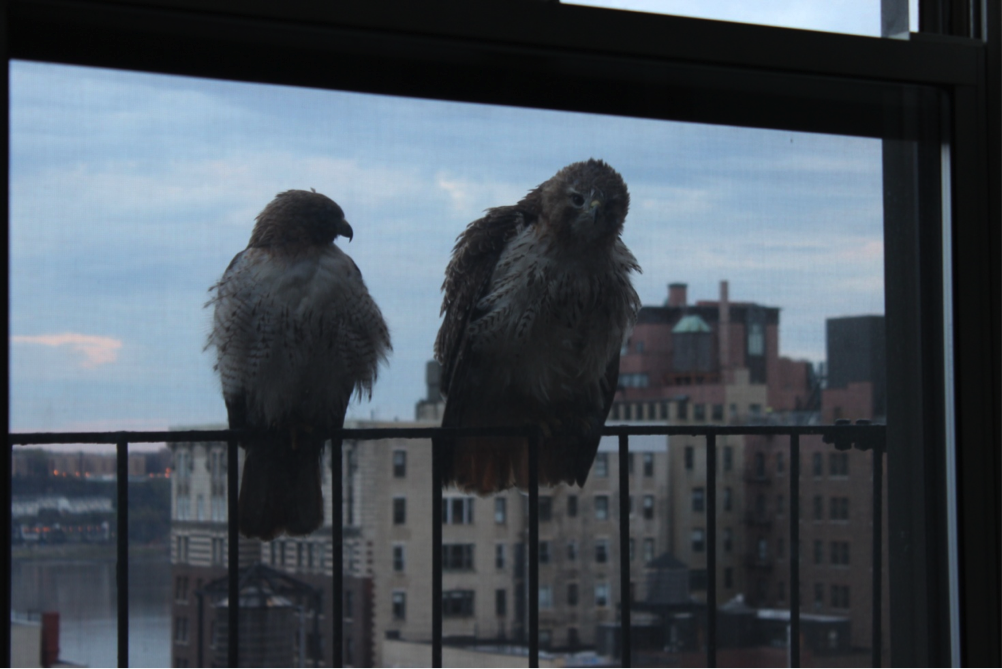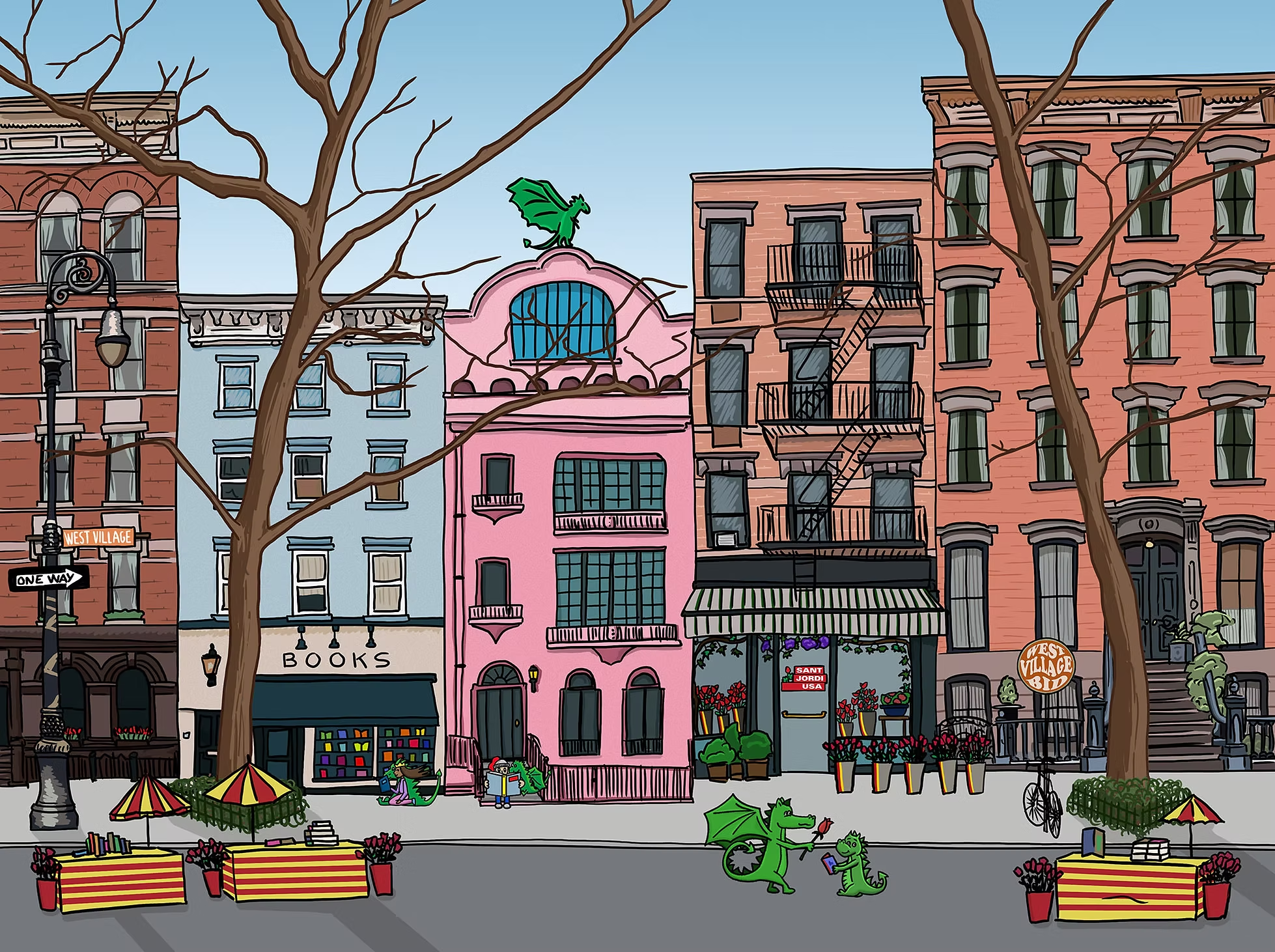
We were staying on the Upper West Side, 15th floor, view of the Hudson. Two hawks nested on the fire escape outside our bedroom window, their baby hawk’s head popping out of its shell. The male was wary. Very. One day, X ray vision on, he stormed the window from afar, a bolt from the blue looming larger, nearer, yeeks! Shot skywards just shy of crashing into the window.
Our hosts, Dennis and Ginger, warned not to stick our hands out, or else. Every morning, the male brought back fresh kill. We spied on our neighbors: the little eyas, featherless, pink and bony, pieces of its shell sprinkled around the twigs, its mother keeping the nest warm, bending her neck to check us out, fierce dad ever on the lookout. We peeked at their meals, plump mouse belly adorned with fresh pigeon wing.
Meanwhile, back on the street, an old Chinese man in a jacket with USA emblazoned on the back scavenged the trash for food every afternoon.
One day we ate lunch at a Zabar’s cafè. The cheese blintzes were chintzy and tasteless, the matzo ball soup watery. You could hardly hear yourself slurp for the voice blaring from a loud speaker not to miss the knife sharpening demo and knife special in the emporium.
There was this everywhere sense of paying more for less and enjoying it less than the olden days. Most deals were bitter-sweetened with the perverse satisfaction of feeling less screwed than imagined. For a country bumpkin like me, New York is always that way, more ruthlessly now than ever.
One square deal was at McSorley’s Old Ale House, on East 7th, with the fries gigantic and crunchy-just-right and ale that has you blabbering in spite of yourself in no time. Tucked into the Irish campaign buttons and Babe Ruth and Kennedy memorabilia on the walls is a review by Malcolm Cowley of Joseph Mitchell’s book on the saloon. Cowley praised the work as unlike most books that make you feel “you’d just paid to look through the wrong end of a telescope.” That says lots about looking at New York, too.
In Washington Square, my daughter got roped into a group of five pedestrians a black guy claimed he would jump over. He worked the crowd a half hour before taking flight, punctuating the hype with a sing-song, “Nobody moves. Nobody gets hurt.” After forever, he circled with a bucket to collect for the cause. One guy closed his fist, miming scooping up a fortune from thin air, and threw it all in.
Before the daunting leap, the guy went up to the group and—as my daughter told me later—whispered, “Keep your heads down. If we crash I could kill you or get killed. I been in prison and I don’t wanna go back.” Then the Human Slinky propelled himself up and over.
The St. Mark’s Bookstore on 3rd Ave. and 8th was packing up to move eastward near Avenue A into half the space, its $23,500 rent way too stiff. Here, of all places, on hallowed ground, just a shade from where the Fillmore East was, where the mythical Five Spot was now Ray’s Pizza. Here, near the Bowery, where 40 years ago I saw a bum observe someone parking a Cadillac, then promptly get up to piss on it. To match the aplomb of that stunt today, he’d have to wait a few minutes for a Lamborghini to glide in.
This righteous part of town has a new moniker: Silicon Alley. The book store clerk motioned across the street to a mass of steel glinting in the sun. “IBM’s moving in there. Check out the corner. Facebook’s going there.”
At the Tenement Museum down on Orchard I sat inside a restored German family’s tiny bar that went back to Civil War days. The man of the family was photographed in his Union blues wearing an old country Prussian fur hat. The Union didn’t supply hats to all their troops. The wee room in back was a living room with a coal burning stove. In back of that was a box of a bedroom and outside its window stood an outhouse. That’s all, folks. Tuberculosis killed most of the family, coal dust a likely suspect.
From the bar the only street view out was out the door. The huge chrome tire of a snazzy pick-up stood high as the door, as a man in shorts and a mess of colors, camera dangling, strolled by. Push carts and orthodox Jews in beards and overcoats drifted past in my memories.
Two scarecrow junkies marched jerkily through the crowd on Houston, a blast from the past that won’t go away.
One night we were at a wedding party close to the Freedom Tower. It’s diamond-like facade flexed sky high muscles, the coolly lit green the new black. You’re supposed to feel small in the vertical thrust of New York, and can’t help but, and you’re supposed to feel big being part of it. That’s a tug of crossed emotions, a roller coaster making life in the insular city of the Manhattoes magnificent and a magnificent bluff.
On day ten, our last in the city, the eyas was stretching its featherless wings. It toppled over, plop, a punk wannabe wet behind the ears. Not to worry. Set to soar in no time.
We took a walk on the wild side in upper Central Park, got drenched in a downpour. Tumbled dry our clothes and sneakers lickety-split before the rush to the airport. I tried to buy postcard stamps at JFK before boarding but they don’t sell them anymore and did away with mailboxes after 9/11.
It was sad to leave. Reluctance writ large, big as the Brooklyn Bridge. How much I love this city I’ve never been able to stand.
Elliot Silberberg is an American writer living in Italy.




